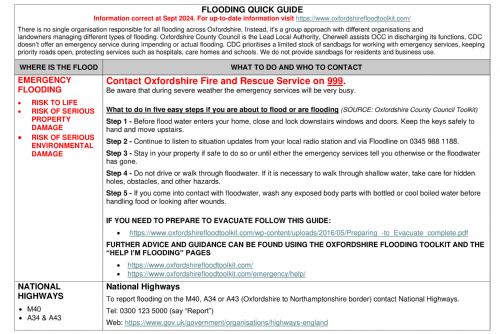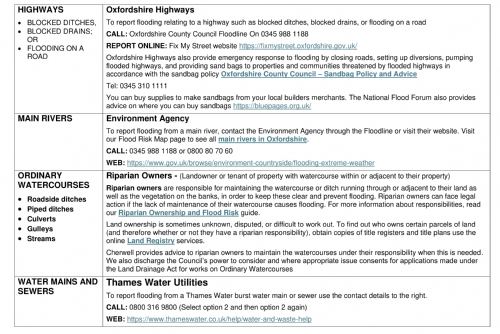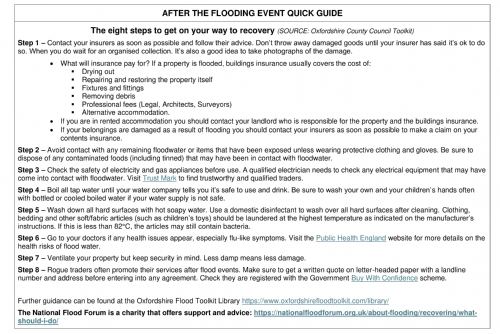Emergency Planning - Useful Resources
Weston on the Green Parish Emergency Plan
The Parish Council have created an Emergency Plan for the parish, which is shared with Oxfordshire County Council.
Oxfordshire County Council
Cherwell District Council
Weather Warnings: The Met Office issues weather warnings when severe weather is expected. These give an indication of problematic weather that may be on its way to Oxfordshire and could further influence river levels.
Power Outages: Scottish and Southern Electricity Networks list power outages at any one moment.
School Closures: Schools are asked to update the county council's website should they need to close for any emergency reason.
Flooding Advice
The Oxfordshire Flood Toolkit is a central hub providing information to homeowners, businesses, landowners, and communities on a range of flood-related topics such as risk areas around the county, preparing for and recovering from an emergency, and roles within the local authority. The Toolkit allows for flooding reports to be made directly to the council.
Oxfordshire County Council have provided detailed guides for the different types of flooding as well as information on who is responsible for each.
Riparian Owners: Riparian owners are responsible for maintaining the watercourse or ditch running through or adjacent to their land as well as the vegetation on the banks, in order to keep these clear and prevent flooding. Riparian owners can face legal action if the lack of maintenance of their watercourse causes flooding. For more information about responsibilities, read OCC's Riparian Ownership and Flood Risk guide.
Land ownership is sometimes unknown, disputed or difficult to work out. To find out who owns certain parcels of land (and therefore whether or not they have a riparian responsibility), obtain copies of title registers and title plans use the online Land Registry services.
Surface Water (Pluvial) Flooding: Heavy rain can cause surface water flooding. Excess rainwater is often diverted into gullies (which feed into sewers), ditches and absorbed into the ground. If gullies or ditches become blocked, water can back up and lead to flooding. Any issues you notice that could increase the risk of surface water flooding can be reported to OCC Highways through FixMyStreet.
Sewer Flooding: The majority of Oxfordshire’s sewage system is maintained by Thames Water. A small number of estates are maintained by private companies.
Thames Water have provided a step-by-step guide for what to do if you experience sewer flooding. Issues can also be reported directly to Thames Water through their website.
Groundwater Flooding: When there is a high water table, flooding can occur from water seeping through walls or floors over time. It is most likely to affect basements. Groundwater flooding can occur weeks or months after continuous heavy rainfall.
Floodline: The Environment Agency are responsible for all ‘main rivers’ in England. Sign up to the Environment Agency’s ‘Floodline’ which can notify you if there is a risk of flooding in your area. Any watercourse not defined by the Environment Agency as a main river is designated an ‘ordinary watercourse’. These are the responsibility of Oxfordshire County Council’s Lead Local Flood Authority (LLFA) Team, who also manage the Oxfordshire Flood Toolkit.
During Flooding
If it is an emergency and there is a risk to life, you should immediately call 999.
If your property is in imminent danger of flooding, please telephone 0345 310 1111.
Sandbgs: Although they can provide protection for short periods of time, sandbags have been identified by the Environment Agency as largely ineffective in mitigating flooding compared to purpose-designed flood protection products.
Cherwell District Council do not provide sandbags to residents and businesses during a flood.
Oxfordshire County Council sandbag policy. Sandbags will only be provided in response to emergency situations, where flooding from the public highway is occurring. Oxfordshire County Council will not provide sandbags where flooding from rivers or ground water is occurring. Please see this policy for more information.
The Royal Life Saving Society has provided advice regarding water safety in a flood.
The AA has also provided advice regarding driving through deep water, heavy rain and floods.
Flood water will likely contain sewage contaminant, so you should avoid walking in it where possible and be aware of risks such as missing manhole covers and exposed electrics.
After Flooding
Once the water has subsided, it is important to be mindful of anything submerged within the flood water. Flood water is often not clean, it can be contaminated with sewage, animal waste and other substances and therefore should be disposed of correctly. The UK Health Security Agency (UKHSA) has shared a wealth of information surrounding the health effects following a flood.
Flood Re is a joint initiative between the Government and insurers that aims to make flood cover more widely available and affordable as part of your home insurance, helping households at the highest risk of flooding. The site also provides advice on helping with flood protection measures within your home and the garden.
The National Flood Forum is an independent charity supporting both individuals and communities at risk of flooding. They provide a number of services including providing advice, ensuring authorities take a community perspective and helping households with recovery after they have been flooded. The Forum has a helpline (01299 403055) open from 9am to 5pm Monday to Friday which can be used to help provide advice about any flooding related concerns.
Priority Services Register (PSR): sign up to PSR lists which will support the identification of vulnerable persons during emergencies. It is a free service which provides extra advice and support, including when there's an interuption to your electricity, gas or water supply.
Advice from Cherwell District Council
Cherwell District Council - Quick Flooding Guide (September 2024)



--------------------------
Autumn Leaf Clearance
As the leaves fall in the autumn months and build up on pavements and roads they can cause a serious problem later in the year as they mulch down and compost in the highway drains and ditches, causing increased risk of flooding on the highways along with slippery pavements.
The Parish Council would be extremely grateful for your support in collecting and disposing of any leaves near your homes, only if you are able and it is safe to do so, to help prevent them going on the highway. As drain clearance is not programmed as frequently as previously any support provided would be extremely beneficial.
Please do not clear an excess of leaves from roads, this work should be carried out by contractors and should be reported via Fix My Street Oxfordshire.
Oxfordshire County Council have provided volunteer guidance on a number of topics (including leaf clearance) via their Oxfordshire Together initiative.
--------------------------
Cold Weather Advice
Oxfordshire Snow guide (pdf format, 429KB).
https://www.oxfordshire.gov.uk/cms/content/salting-gritting-and-snow-clearance
http://www.oxfordshire.gov.uk/cms/content/salt-and-grit-bins
Hot Weather Advice
Beat The Heat advice from the Government and Community Hot weather advice from Oxfordshire County Council.
Further advice around keeping cool in heatwaves can be found: Keeping cool in heat waves | Oxfordshire County Council
If you are concerned someone may be overheating, seek medical advice by contacting
NHS 111. In an emergency, or if you think someone has heatstroke, dial 999. For further
information on heat exhaustion and heatstroke symptoms, please visit: www.nhs.uk
